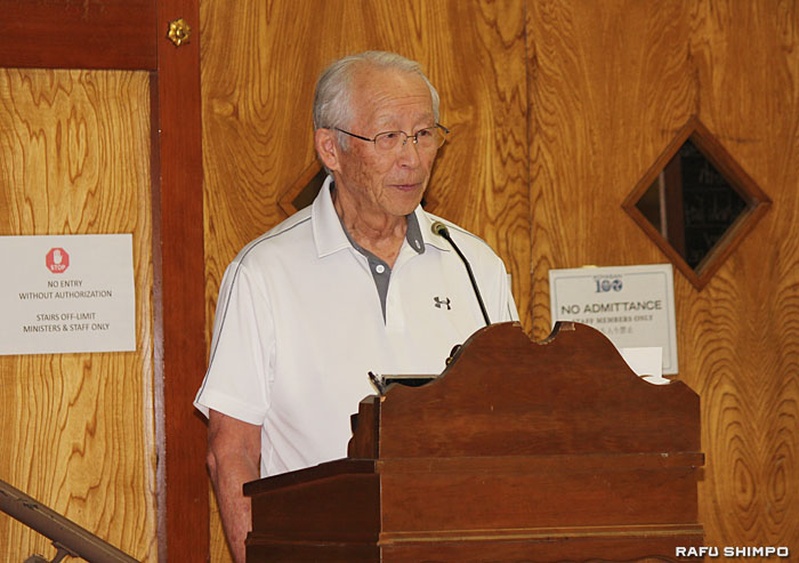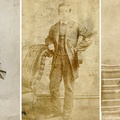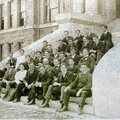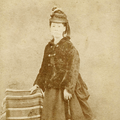Memorial service for the victims of the atomic bombs in Hiroshima and Nagasaki
"It was a beautiful summer morning. On August 6th, 74 years ago, I was seven years old at the time and experienced the atomic bombing with my brother, who was two years older than me. We were about 0.6 miles (about 1 kilometer) from the hypocenter." Howard Kakita (81), a third-generation Japanese-American, was a guest speaker at the memorial service held on the 4th at Koyasan Betsuin in Little Tokyo, where he shared his experience of the bombing with the local people. We listened to the story of Kakita, who appeals for the abolition of nuclear weapons and passes on his thoughts about peace to the next generation.
The family was separated between Japan and the U.S. Parents were sent to the Poston Internment Camp.
Kakida was born in Boyle Heights in 1938. In early 1940, her paternal grandfather in Hiroshima became ill, and Kakida, who was two years old at the time, and her family traveled to Japan. Kakida's mother was eight months pregnant at the time. She later gave birth in Japan, and her younger brother was born.
After arriving in Japan, his grandfather's health improved, but six months after the reunion, the family had to return to the U.S. As the time to return to Japan drew near, his grandfather's health deteriorated again. Kakida's parents entrusted Kakida and his older brother with caring for his grandfather, and returned to the U.S. with his newborn brother.
During the war, Kakida's parents were interned in a concentration camp in Poston, Arizona, and he and his brother lived in Hiroshima, so the family was separated between Japan and the United States.
Mr. Kakida's experience of the atomic bombing
August 6, 1945. It was a beautiful summer morning with a clear blue sky. Kakida was getting ready to go to school, but when the school was closed due to an approaching American military aircraft, he quickly changed into his play clothes. However, shortly after, an air raid siren sounded. It was around 8:00 a.m.
When Kakida and his brother quickly climbed onto the roof, they caught sight of a B-29 flying toward the city.
The brothers immediately got off the roof, the older brother went to the gate, the grandmother went inside the house, and Mr. Kakida fled to a building where the bathroom was. Then, at 8:15 a.m., the atomic bomb was dropped on Hiroshima.
Immediately after the atomic bomb was dropped, Kakida lost consciousness. He says he neither saw any light nor heard any explosion.
It is unclear how long he was unconscious, but when he regained consciousness he found himself buried in the collapsed bathroom amid flames and smoke. He was not seriously injured and was able to climb out on his own.
The brother suffered minor burns to his forehead, but was unharmed. The grandmother, who was in the kitchen, was crushed under the collapsed building, with shards of broken glass piercing her body. The grandfather and a man in the neighborhood found her and rescued her. She was covered in blood, but at least her life was saved.
"It was almost a miracle that my grandparents and siblings survived," Kakida recalls.
At the same time, flames were engulfing collapsed houses and quickly spreading across the city. My grandmother and her siblings fled the city while my grandfather helped put out the fires.
Meanwhile, my maternal grandparents, who were also in Hiroshima, died in the atomic bombing. They were farmers, and my grandmother was killed in the bombing while transporting goods to Hiroshima city. Because they were close to the hypocenter, no body was found. My grandfather, although seriously injured, made it home, but died a few days later.
Corpses on the road, fallen hair
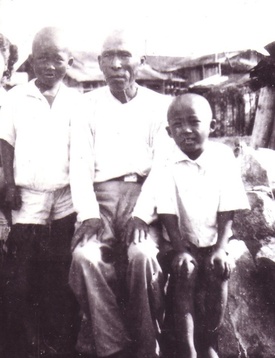
While evacuating from the city towards the mountains, Kakida witnessed a horrifying sight. "People with severe burns whose skin was falling off their bodies, people covered in blood, people pleading for help and asking for water. Corpses were scattered all over the road, and it was a gruesome sight. The memories of that time are burned into my eyes and my heart, and I still can't forget them."
Kakida took refuge at a relative's house in Kabe Town (now part of Hiroshima City), 10 miles (about 16 kilometers) north of Hiroshima, where he remained until the end of the war.
The atomic bomb destroyed the entire city of Hiroshima, leaving no trace of it. All that remained were the concrete and iron frameworks of buildings. "Ash-turned corpses were scattered all over the city, and rotting corpses were floating in the rivers that ran through the city, giving off a foul odor."
A few weeks later, something strange began to happen to Kakida's body. "All my hair fell out and I suffered from severe diarrhea. Fortunately, my hair started to grow back, but my paternal grandfather later got cancer and never recovered, passing away in 1947."
Memories of that time revived, towards a nuclear-free world
Meanwhile, Kakida's parents, who had returned to the United States, were interned at the Poston Internment Camp in Arizona. Newspapers from that time had detailed information about the location of the atomic bombing, and the parents learned that the Kakida brothers had been located near the hypocenter. They were in the depths of despair, but with a glimmer of hope in their hearts, they inquired about the safety of the two brothers at various organizations and searched for them. Then, a few months later, the Red Cross found the Kakida brothers, and the parents were informed that they were alive.
After the war ended, his parents and younger brother moved to Los Angeles, and the Kakida siblings returned to the United States in 1948. Thus, the family was reunited and began life in a new place.
When he returned to Japan, he said he had no anger toward the United States for dropping the atomic bomb. "I can't stand it," he muttered.
However, Kakida's suffering continued after that. "According to my mother, she frequently had nightmares. Also, because of the scene she saw at the time, she could no longer eat rare beef, meat sauce, pasta, or other red foods, which reminded her of blood."
It took 10 years for him to overcome it. Even now, at age 81, the scene from that time comes back to him vividly. It was a painful and tragic experience for a young boy.
"Today's nuclear weapons are far more powerful than the atomic bombs dropped on Hiroshima and Nagasaki. They have the power to destroy the world. I cannot understand any country that possesses such nuclear weapons and seeks to use them," he said emphatically.
"This year marks 74 years since the atomic bombing. Nuclear weapons are terrifying. Japan remains the only country in the world to have suffered an atomic bombing. As one of those victims, I want to appeal to people that nuclear weapons must be abolished."
For the atomic bomb survivors, August 6th is something they will never forget. It is the day when nuclear weapons were used for the first time in the world. Even as they grow older, the survivors continue to talk about their experiences and appeal for the abolition of nuclear weapons with a desire for peace in their hearts, so that the same mistake will not be repeated.
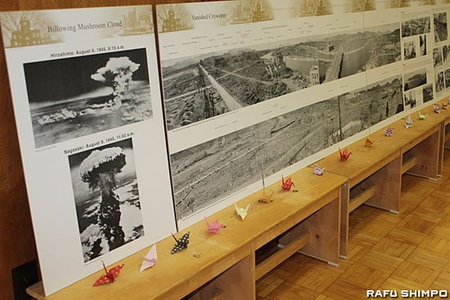
*This article is reprinted from The Rafu Shimpo (August 16, 2019).
© 2019 Junko Yoshida / The Rafu Shimpo


